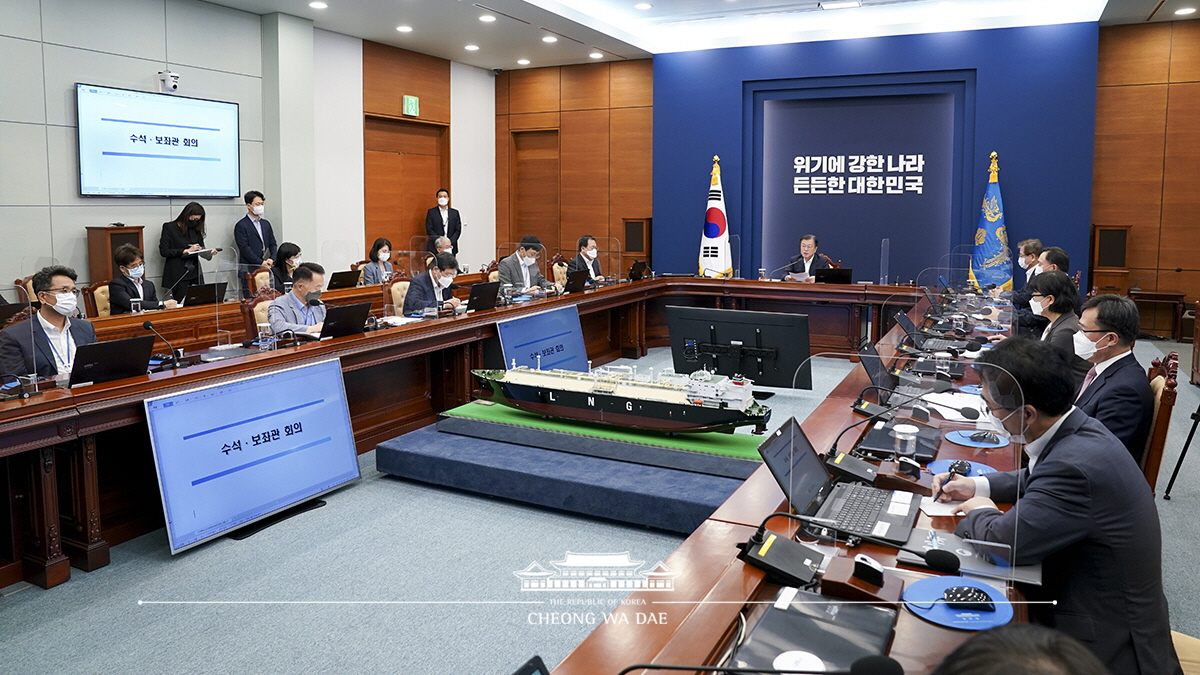이 웹사이트는 제19대 대통령 임기 종료에 따라 대통령기록관이 「대통령기록물 관리에 관한 법률」에 의해 이관받아 서비스하는 대통령기록물입니다. 자료의 열람만 가능하며 수정 · 추가 · 삭제는 불가능합니다.
다만, 「개인정보보호법」에 의하여 개인의 정보를 보호받기 원하시는 분은 관련 내용(요청자, 요청내용, 연락처, 글위치)을 대통령 웹기록물 담당자(044-211-2253)에게 요청해 주시면 신속히 검토하여 조치해 드리겠습니다. 감사합니다.
SPEECHES & REMARKS
BRIEFINGS
Opening Remarks by President Moon Jae-in at Meeting with His Senior Secretaries

Today, two outside experts are joining us: Senior Researcher Hong Seong-in of the Korea Institute for Industrial Economics and Trade and Managing Director Jeong Seok-ju of the Korea Offshore and Shipbuilding Association. Please give a hand to those joining the discussion of today’s agenda items.
Everyone is having a hard time as the COVID-19 pandemic drags on. I look forward to us all working together to generate hope that our normal routines will return and people’s livelihoods improve by comforting each other and giving encouragement. We have fared well so far – having overcome the crises better than any other country and elevated the global standing of the Republic of Korea, a country that is resilient to crisis and shines brighter when facing adversity. However, I know all too well that this accomplishment rests upon the suffering and cooperation of many people. I am always very grateful to them.
The process of disbursing relief payments will begin today. When emergency relief payments were provided to all citizens last year, many beautiful stories that brought tears to our eyes were reported at that time. This time again, I hope relief payments will comfort and give encouragement, albeit slightly, to those who are going through a trying time. In particular, the payments can hopefully be of help to the vulnerable, traditional markets, neighborhood stores, restaurants, microbusiness owners and the self-employed, contributing to revitalizing people’s livelihoods and local economies.
The Government will do everything it can to dole out the payments rapidly while minimizing any inconvenience. Notably – for the first time in the world – we have developed and made available a new system: the Virtual Assistant Service for the Public. This personal secretary at their fingertips will allow the public to access customized information and apply for and receive payments with ease. The application and disbursement process for these relief payments will fully reveal our capabilities as a digital powerhouse and a leading country in e-government.
Our exports have reached beyond recovery and are rewriting the Republic of Korea’s trade history. Exports in August also rose 34.9 percent to hit a record high for the month. Our exports have broken the monthly record for six months in a row, breaking the US$400 billion in the first eight months of this year, the shortest period ever. If the trend continues, we will see exports at an all-time high this year. I’d like to express my gratitude and encouragement for our workers and businesses as they prove the Republic of Korea’s manufacturing potential through their hard work in the face of crises.
In addition to astonishing quantitative growth, the strong competitiveness of Korea’s economy has been demonstrated qualitatively as well. Item-by-item analysis of our export growth reveals the ways our economy has become more solid. Along with conventional flagship industry exports such as semiconductors, petrochemicals, general machinery and automobiles, those of promising new growth industries have also performed well, recording double-digit growth in each of the 15 key items for the first time in history. In particular, exports from such new industries as biohealth, rechargeable batteries, agricultural and aquatic foods, and cosmetics have all hit record highs.
These strong exports in the first half have allowed our semiconductors, shipbuilding, smartphones, OLEDs, TVs and other flagship industries to maintain their firm global standing with the largest market shares. Promising industries have also grown rapidly. Korea has emerged as the world’s No. 1 country in terms of SSD exports. In addition, our exports of electric vehicle batteries have more than doubled compared to last year, aggressively chasing the world’s pacesetter China in this field. Our country also joined the ranks of the top five exporters of cosmetics worldwide.
Amid the COVID-19 crisis, the Korean economy is being reborn, becoming even stronger. If we enhance our digital competitiveness and expedite the transition to an eco-friendly, low-carbon economy – the overriding trend of our time – as if it were a matter of life or death, the competitiveness of our export industries will become even more formidable in the future.
Though exports continue to be brisk, sluggish domestic demand is delaying the recovery of people’s livelihoods. In particular, the protracted suffering of the face-to-face service industry, the tourism and culture industry, microbusiness owners and the self-employed continues, for which I cannot help but feel regret. Although the Government has had no choice but to extend heightened epidemic prevention and control measures, we share the same desire to restore daily routines as soon as possible. In tandem with the rising vaccination rate, we will do all we can to help businesses gradually normalize their operations going forward, that includes easing restrictions on the number of people allowed to gather for those who have been fully vaccinated.
Fortunately, thanks to the public’s active participation, the vaccination rate is rising rapidly. The number of people who have had their first shot has passed 30 million, and the vaccination rate for adults age 18 or older is approaching 70 percent. The proportion of those who are fully vaccinated has also exceeded 40 percent and is rising sharply – recently recording the world’s fastest pace of inoculation. It won’t be long until Korea becomes a leading nation in vaccination as well.
The increasing vaccination rate will allow us to seek a gradual transition to a new epidemic prevention system – one that enables anti-epidemic measures to be balanced against daily lives – as the COVID-19 situation is brought under control.
While setting our sights on making it over the last ridge, I would like to propose that we muster our strength and press on.



